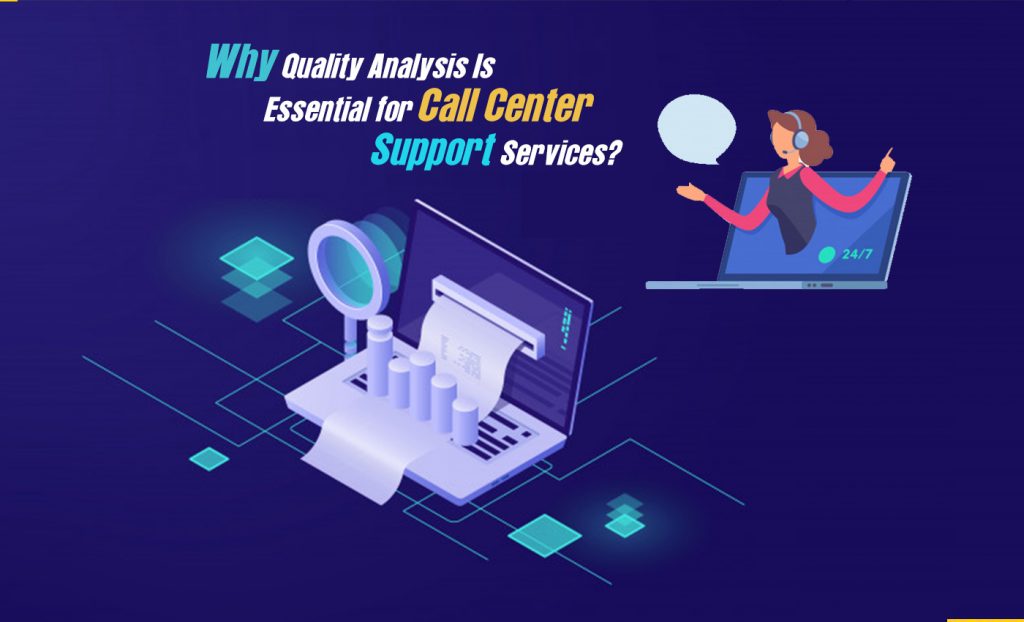The results obtained via call center support services can be very misleading. Especially when you are not looking at the operation as a whole, you might land up in tough situations from where it could be very difficult to get out.
An example will clarify this for you. Let’s say that you run a call center and you are getting positive feedback consistently from your customers. You would think that everything is fine. There is no need to improve anything. But actually, your agents might be threatening your customers into filling up CSAT forms with positive feedback. For example, they might intimidate them with possible service disruptions, future inconvenience or no support in the future. So, you may feel that everything is going well, but the customers are actually getting harassed.
Such practices simply cannot be tolerated as they ultimately cause the downfall of the entire business operation. Hence, it is important to have a Quality Analyst (QA) department as part of the call center support services to ensure proper and ethical operations.

The Call Center Hierarchy
Whether it is international or domestic call center services, the call center hierarchy remains the same with mild differences depending on organizations. To understand where QAs come into the picture, it is important to have some knowhow about the complete chain of command:
Agents
The ones who take calls are the most important personnel in a call center operation.
Team Leaders (TLs)
Agents are directly managed in small teams by TLs. The TLs are the ones who bind the team into a cohesive unit.
Subject Matter Experts (SMEs)
The experienced callers are recruited as SMEs. These SMEs have thorough knowledge of the process and are tasked with helping agents on difficult calls and situations.
Managers
The TLs and their agents are managed by call center managers. The managers overlook the team productivity, efficacy and efficiency. A manager can be in charge of several teams.
Trainers
The trainers are tasked with teaching agents on the process and voice & accent.
Quality Analysts (QAs) QAs are tasked with hearing the calls taken by the agents. QAs do not hear all the calls but only the ones selected according to a preset criterion.
The Role of Quality Analysts in Call Center Support Services
Quality Analysts perform the following tasks:
- To check whether agents providing call center support services are adhering to the policies, QAs listen to the calls randomly. They rate the agents based on how well they have carried the work in accordance to the preset KPAs. In case, they find agents flouting the rules or making mistakes, they provide them the necessary feedback.
- QAs set the benchmark for the entire call center operation. They study the trends and the practices prevalent in other call center processes. And, then they conceptualize the best QA program for attaining improved results from the agents.
At Vcare, we have some of the best Quality Analysts looking over our various call center projects. We understand the importance of QAs and choose the best ones for the task. Most of our QAs are selected from within the organization and are well-drilled on their core responsibilities. We offer completely reliable and trustworthy services for both international and domestic call center services.
Planning to hire a call center outsourcing companies in USA ? Read our FAQs
Q: What services does your outsourcing company offer?
A: Vcarecorporation offers a wide range of services, including but not limited to: customer support, IT support, accounting and finance, human resources, data entry and management, content creation, digital marketing, and software development.
Q: How does outsourcing work?
A: Outsourcing involves hiring a third-party company to perform certain tasks or functions for your business. This can include anything from customer service to software development. The outsourcing company will provide the necessary resources, skills, and expertise to complete the work, while your business focuses on its core competencies.
Q: What are the benefits of outsourcing?
A: There are several benefits of outsourcing, including cost savings, access to specialized expertise, increased efficiency, and greater flexibility. By outsourcing certain functions, businesses can reduce their overhead costs, improve their productivity, and focus on their core competencies.
Q: What types of businesses can benefit from outsourcing?
A: Businesses of all sizes and industries can benefit from outsourcing. Small businesses can benefit from outsourcing to reduce their overhead costs and focus on growth, while larger businesses can benefit from outsourcing to access specialized expertise and increase their efficiency.
Q: How do you ensure data security in outsourcing?
A: We take data security very seriously and have strict policies and procedures in place to ensure that our clients’ data is protected. We use secure communication channels and data encryption technologies to protect against unauthorized access, and our teams are trained to follow strict data security protocols.

